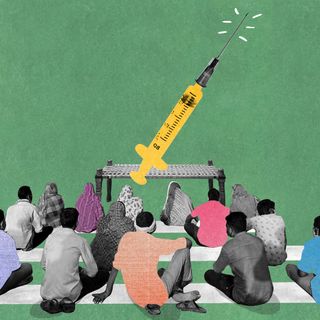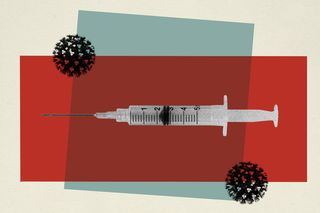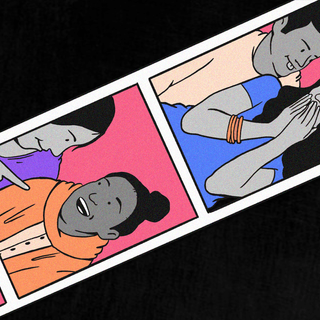
Omicron May Shape the Vaccine Booster Dose Debate in India
A government panel recently recommended booster doses for people aged 40+, but later noted the need for more experiments.

The new Omicron variant of the coronavirus has revived the Covid19 vaccine booster debate, globally and within India. The booster shot is the third dose some countries have started offering in cases of waning immunity protection.The renewed focus is also on how the immunity offered by existing vaccines withstands the new mutations.
It is important to note thatmost conversations around vaccine redesign and booster shots rely on evidence (even if partial) from Western countries. Globally, the data showsa booster dose of one of the mRNA vaccines (like Pfizer or Moderna) offers an added layer of protection, but the durability and effectiveness against the new Omicron variant are still unknown. The mRNA vaccines use a copy of a molecule called messenger RNA to cells instructions for how to make the S protein found on the surface of the Covid19 virus; priming it to make antibodies. In other words, an mRNA vaccine delivers the instructions for making a viral protein to our cells. The process is different from other vaccines like Covishield, which uses the adenoviral vector technology to trigger an immune response using a modified version of a different virus.
Within India, the conversation is still in the nascent stage. There’s no conclusive data on what Indian-manufactured vaccines (like Covishield or Covaxin) may offer. Last week, the ICMR notedthe Delta variantthat swept the world earlier this year had the ability to neutralize some of the vaccine’s immunity and recommended a booster dose. But this recommendation, which is not peer-reviewed yet, is not based on tangible numbers.
Even a consortium of India’s top genome sequencing laboratories, the Indian SARS-CoV-2 Consortium on Genomics (INSACOG), last week in a bulletin favored the prospect of booster doses for people over 40 years of age. On Saturday, however, they retracted the observation to say thatmore scientific results are needed to gauge the impact of booster doses. It was notablythe first official Indian body to suggest a third dose of Covid19 vaccines.
The consensus so far isOmicron, with a “horrific” count of mutations, may impact the vaccine’s efficiency. Previously, the immune system (through B and T cells) carried a memory of encountered pathogens and worked well before time. It seemed that most people with two or three doses (booster doses) would maintain long-term protection against severe disease. Immunologist Ali Ellebedy, at the Washington University School of Medicine in St. Louis, Missouri, just hours before Omicron’s news broke, told Nature: “Our immune response to these vaccines is really robust if you are healthy. Barring any massive surprise variants, I don’t see any reason why we’d need to get a fourth dose.”
But Omicron may change things.
Related on The Swaddle:
Omicron Variant Did Not ‘Originate’ in South Africa, It Was ‘Detected’ There. The Difference Matters
“It’s a question of whether a virus has changed enough so that antibodies created by the original vaccine are no longer able to recognize and fend off the new mutated variant,” microbiologist Deborah Fuller said, explaining why the current vaccines may need to be updated. She notes that since the Omicron variant contains a new pattern of mutations to its spike proteins, the changes could impact the ability of some mRNA vaccines (like Pfizer and Moderna) to neutralize the infection. The mRNA Covid19 vaccines work by “giving instructions in the form of mRNA that direct cells to make a harmless version of the spike protein,” Fuller added. “This spike protein then induces the human body to produce antibodies. If a person is then ever exposed to the coronavirus, these antibodies bind to the coronavirus’s spike protein and thus interfere with its ability to infect that person’s cells.”
Beyond mRNA vaccines, the overall consensus is still shaping up. Alessandro Sette, a vaccine biologist at La Jolla Institute of Immunology, California, says it is less likely the mutation will compromise T cells’ ability to recognize the virus and attack infected cells. “But these are early days,” he warns, and many more experiments are needed to assess the variant’s impact.
While the conversation is very global-centric, it bears reason to demand a more strengthened corpus of data that examines Indian vaccines. Experts had previously criticized the hastened mechanism through which Covaxin, the vaccine made by Bharat Biotech, was passed; chiding the authorities for giving it the go-ahead despite its trial data notbeing published. At a time when so much uncertainty remains, the scientific study on booster shots and vaccine efficacy would require complete transparency and an evidence-based approach in how results are relayed.
The Indian health ministry has noted the mutations on the Omicron spike gene may decrease the efficacy of current vaccines. But the “[v]accine protection is also by antibodies as well as by cellular immunity, which is expected to be relatively better preserved.”
The uncertainty of Omicron mutations also overlaps with the politics around booster doses. Many global-health researchers previously opposed widespread booster campaigns while immunization rates remain abysmally low in large swathes of the world. “Boosters have already spurred debate over issues of equity and prioritization of limited vaccine resources, and scientists worry that wealthy countries’ rush to offer more boosters in the face of Omicron will further exacerbate the global vaccine imbalance — a disparity that many health researchers say probably contributed to Omicron’s emergence and rapid spread,” Nature noted.
A similar argument was offered in Lok Sabha last week, when Health Minister Mansukh Mandaviya said the focus of India’s vaccination drive is to expand the coverage of the second dose. The consortium is expected to meet on Monday to discuss additional doses for high-risk groups, like healthcare workers and people with immunocompromised conditions.
“This may be called an additional dose, which is being considered for immuno-compromised people to provide additional protection as they are at a higher risk. It’s different from a booster dose that is given after the immunity wanes,” a government expert told Hindustan Times.
Saumya Kalia is an Associate Editor at The Swaddle. Her journalism and writing explore issues of social justice, digital sub-cultures, media ecosystem, literature, and memory as they cut across socio-cultural periods. You can reach her at @Saumya_Kalia.
Related


What Happy Relationships Look Like, According to Research
